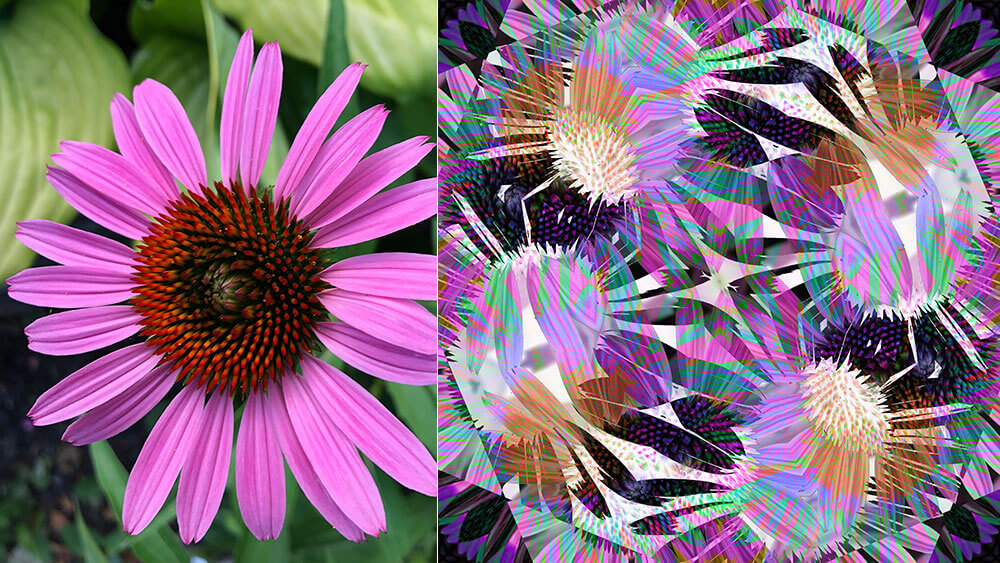
Like many people around the world, the Convene editorial team has invested time in leisurely pursuits during the pandemic. Digital editor Curt Wagner transforms photos he takes (left) into new designs.
About four weeks into the COVID-19 restrictions, I was weary of what had become my routine: watching TV every night after working — from home — and then going to bed. I yearned to be more creative. I wanted to make life during this sad and anxious time a little more beautiful. So every time I put on my mask and went out for a walk, phone in hand, I took photos of whatever caught my eye. Back at home, I’d spend hours digitally manipulating my photos of flowers, trees, a fence, or feature of a building, to create something completely different using photo-editing software.
Like me, people around the world have been pursuing a favorite hobby or starting a new one, spurred on by isolation or boredom or as a way to forget about all the craziness in the world, and the media has taken note. Need proof? A web search for “pastimes and coronavirus” yields more than 7 million results.
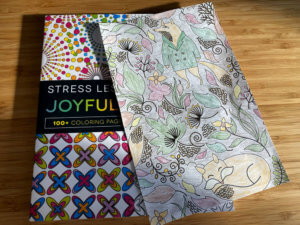
Associate editor Casey Gale relaxes with adult coloring books.
People are exercising, collecting items, reading, gardening, cooking, baking, brewing beer, coloring in adult coloring books, drawing and painting, knitting and crocheting, and pursuing other forms of arts and crafts. Former First Lady Michelle Obama recently said that her family has been doing jigsaw puzzles.
Having something to put energy into besides doomscrolling can be a way to express yourself and release stress, experts say. It turns out my project is a healthy diversion from a constant barrage of bad news. The pandemic has ravaged the business events industry and pushed friends and many others into unemployment. The murder of George Floyd sparked wide-spread demonstrations in support of the Black Lives Matter movement, as well as some much-needed, brutally honest self-reflection on the part of white America. And don’t even get me started on politics, America’s response to the pandemic, or the unwillingness of so many to simply wear a mask to slow the virus and save lives.
But there’s only so much news and social media one can take. Channeling my energy into something positive has been my saving grace. I’m obsessed with my photography project. Almost every day after work, I move to my favorite chair to fiddle with Photoshop and create my art. And because of it, I’m far more ready to deal with bad news or a roadblock at work or home.
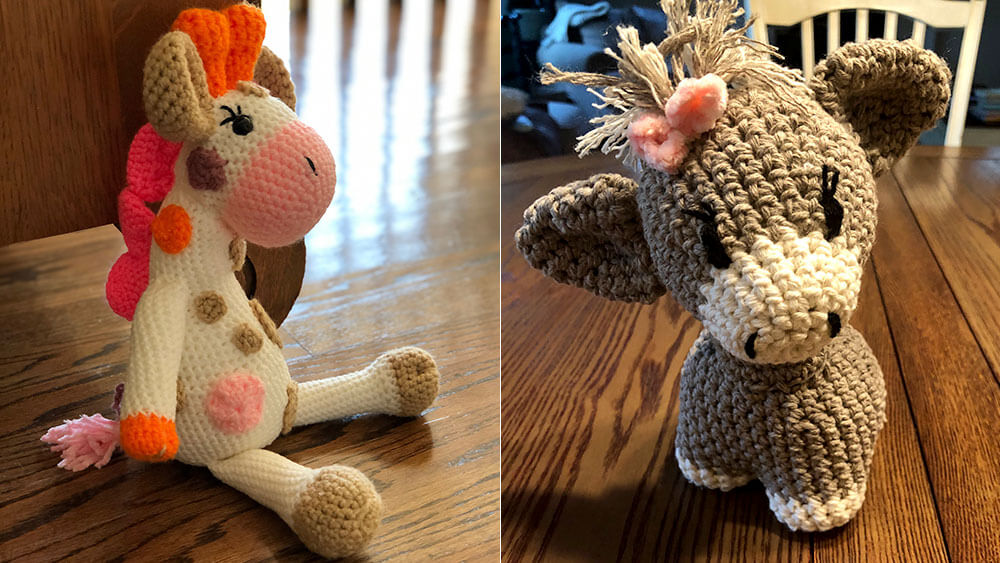
Michelle Russell has taken up amigurumi — crocheting animals for her now newborn granddaughter.
Good for the Brain
Creative pursuits help people’s brains function at an “optimal level,” said Jillian Cardinal, a sales manager at Montreal- based event company JPdL and founder of the Eventprofs Book Club. That’s backed up by John Randolph, Ph.D., a clinical neuropsychologist and author of The Brain Health Book: Using the Power of Neuroscience to Improve Your Life, who wrote in a recent Psychology Today column that “compelling research” shows lifestyle pursuits that challenge people mentally — music, books, crossword puzzles, games, for example— are good for the brain in various ways.
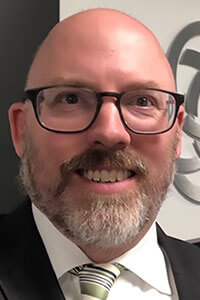
Michael Kocet
One of those ways is easing the stress on mind and body. People can “balance the stresses brought on by the pandemic by tapping into their creativity,” said Michael Kocet, Ph.D., a licensed mental health counselor and professor and department chair of the Counselor Education Department at The Chicago School of Professional Psychology. “Having hobbies can be essential to maintaining mental health and wellness,” he told Convene.
In a period of so much uncertainty, hobbies provide people with “a sense of accomplishment that is satisfying and comforting,” he said. Kocet, an avid cook who created and teaches a “culinary therapy” program, has been — naturally — cooking up a storm during his free time. Like my neighbor who seems determined to fatten me up, bringing me the candied jalapeños, berry jams, baked goods, and baby back ribs she’s whipped up in her kitchen, it’s not just the act of baking and cooking that Kocet finds so satisfying, it’s sharing the fruits of his labor with others. When Kocet gave his neighbors banana bread he’d made “with his own hands,” he said seeing that they enjoyed it gave him a sense of accomplishment.
Kocet believes that both cooking — which can give the home chef license to change up a recipe —and baking, which is more precise, can improve mindfulness. And especially at uncertain times like these, they can give the participant a sense of control over the outcome of the finished product. “In my experience, cooking and baking do help people manage stress, anxiety, depression,” he said. “The one thing that I’ve told people during this pandemic is it’s comforting to return to recipes that connect people with family, but also I encourage people to try new recipes.” Kocet said he plans to do a research project on how cooking and baking have helped people cope with the pandemic.
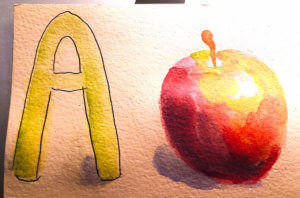
Deputy editor Barbara Palmer draws and paints alphabet postcards to send to her young grandson.
Perfection Is Not the Goal
Kocet also confessed to returning to a favorite childhood hobby: Completing sticker books that take the form of animals and other things. Which makes another point about pursuing a hobby: You don’t have to prepare a 5-star dish, write the next great American novel, or create a museum-ready piece of visual art. Don’t worry if you finish crocheting a blanket only to find your handiwork turned out to be a trapezoid, or if the watercolors bled outside the lines of your artwork. The idea is to relax and enjoy your pursuit, not to put pressure on yourself, Kocet said.
“When you’re doing that activity or when you finished, do you feel better? Do you feel more calm or relaxed?” he asked. “Don’t think, ‘Oh, I have to do this hobby perfectly.’ It’s not about that.”
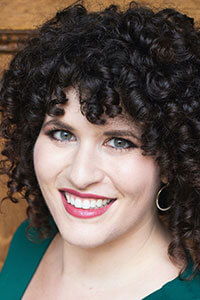
Jillian Cardinal
Cardinal, who is reading and writing more during this time, shared the same advice. If you do find yourself feeling pressure, she suggested looking for something that “lets you breathe and enjoy the moment.” “There is so much going on right now that time should be carved out doing what feels good and empowers you mentally, physically or emotionally,” she told Convene. Each day, she attempts to do things “related to movement, to connection, and to culture,” she said. “In whatever way, they bring me the most joy.”
When the future seems so uncertain, the most important point of pursuing an interest has to be nurturing emotional intelligence. “We need to keep our mental and emotional fortitude and that is by taking care of and nourishing ourselves first,” Cardinal said. “Hobbies allow us to explore another facet of ourselves and from there, learn more about who we are and what we enjoy.”
Curt Wagner is digital editor at Convene.
This story is part of Convene‘s September CMP Series package on ways the world has changed since COVID-19 and what we hope will stick once the pandemic is behind us.
